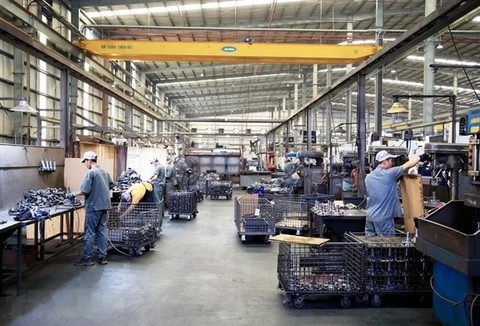Businesses call for greater support in face of growing challenges
Businesses call for greater support in face of growing challenges
Businesses are in urgent need of additional support in the face of ongoing challenges in 2024, as well as the implementation of green production and digital transformation, said industry experts and insiders.

Workers in a factory in Trảng Bom District, Đồng Nai Province. — VNA/VNS Photo |
Many businesses have voiced concerns over a lack of information and support policies despite growing interest in the business community for the promotion of green production and digital transformation.
A survey by the Đồng Nai Business Association, home to a large number of both domestic and foreign companies in southern Việt Nam, revealed most businesses have been struggling with weak consumer demand, which has resulted in reduced working hours for workers, especially in export-oriented companies.
They said complicated administrative procedures, regulations and implementation guidelines hindered their ability to access the Vietnamese government's various support benefits, notably the credit support package under Decree 31/2022/NĐ-CP. For example, the country's fuel market, despite experiencing severe disruption in 2023, had been operating without significant support policies, which left retailers with close to zero discounts since the beginning of 2022.
To make matters worse, regulations often overlap and create unnecessary hurdles for businesses instead of helping. For example, under Decree 136/2020/NĐ-CP on fire prevention and fighting regulation, businesses were told to implement new firefighting plans over the existing ones, which led to additional compliance costs for many.
Nguyễn Minh Châu, vice chairman of the association, called on the Government to simplify administrative procedures and grant businesses easier access to credit. At the same time, there should be additional directives to help ministries and other governmental bodies to quickly amend and adjust regulations that are no longer suitable or beneficial to industries, especially fuel trading and retailing, to avoid and minimise market disruption.
The business community also called for greater support from provincial governments regarding access to capital, interest rates, tax exemptions and reductions in fees, as well as additional trade and investment promotion events. They said such events could help connect businesses with potential investors, transfer technological know-how and attract much-needed capital.
Deputy chairwoman of the Đồng Nai's Provincial People's Committee Nguyễn Thị Hoàng said in 2024, businesses in the province would likely face difficulties due to input material shortages, rising fuel prices, and increased transportation costs. She said the province's top priority this year would be to provide businesses with more support mechanisms and policies, including more streamlined administrative procedures and timely assistance for all business needs.
On the topics of green production and digital transformation, business representatives said they had not been well informed on the specific criteria, regulations and support programmes, or were not even aware of any on a local level.
"It will be difficult to get businesses moving in that direction without stronger efforts to collaborate with business associations to disseminate this information in the business community," Châu said.
Lê Bạch Long, chairman of the Young Entrepreneurs Association of Đồng Nai, said effective two-way communication between provincial leaders, departments, local authorities and the business community would be crucial to motivate businesses to implement their production and business plans.



























